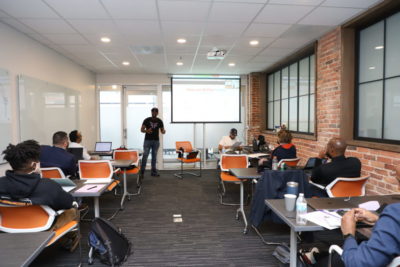Written by Technically Media CEO Chris Wink, Technical.ly’s Culture Builder newsletter features tips on growing powerful teams and dynamic workplaces. Below is the latest edition we published. Sign up to get the next one.
We use the phrase “tech jobs” today to refer to engineers, developers and other professionals directly involved in the development and maintenance of software. Call them “technologists” ( and not “techies,” please). In contrast, “jobs in tech” refers to the industries that employ those and many additional titles.
Look at Fearless, the digital services firm founded and headquartered in Baltimore’s downtown/Inner Harbor area. It builds and maintains custom software and employs 250 people, mostly in Maryland.
“We’re building a company to be part of our community, to have impact,” said the company’s founder and CEO Delali Dzirasa, 42.
The difference between tech jobs and jobs in tech
As much as half of Fearless’ team work in ostensible “tech jobs,” if one counted design and some product roles. The other half comprises those in sales, marketing, operations and all the other functions that any established company has; since Fearless builds software, they’re all “jobs in tech.”
So, if you’re a software developer, whether your company builds software or sells cement, you have a “tech job.” Conversely, as a product manager, a digital marketer or an accountant, if your company sells software then you have a “job in tech.”
This is timely because of the brutal year of high-profile layoffs in tech. According to Layoffs.fyi, a crowdsourced list that Roger Lee launched in 2020, nearly 1,000 tech companies have laid off almost 150,000 people. While some tech company layoffs have included “tech jobs,” but far more have been “jobs in tech,” across functions. (To confuse the matter further, the term “tech workers” is sometimes used to combine both groups.) This is an important nuance for those charting the course of a city’s economic future.
Why city leaders pursue jobs in tech
Cities are vying for jobs that can be done remotely for two obvious reasons: They’re valuable and growing fast. Recently revised research suggests that each “tech job” supports another 4.4 local jobs — everyone from the carpenter to the barista to the surgeon. According to the U.S. Census Bureau, the number of people working from home tripled between 2019 and 2021, and recent analysis indicates that a quarter of professionals work remotely at least part-time. More than half of tech jobs are, reports McKinsey.
Though custom software shops like Dzirasa’s tilt more heavily toward tech jobs, as a rule of thumb, say a tech company’s engineering team makes up 20% of the overall headcount — ranging a bit depending on the company type and how staff are grouped. That means growing tech companies hire many different people, including those fashionable tech jobs.
For much of the last 20 years, many US cities have fashioned themselves hubs for tech jobs and new-age entrepreneurship. Surging remote work, especially among tech workers, offered additional opportunities for more localities to attract these hyper-productive residents.
Would a recession hurt local tech economies?
Now, as our pandemic economy slows, there’s been a clawback. Nearly two in three managers said layoffs will come more swiftly to those working remotely. Early reports show that most firms are more likely to “hoard” engineering talent while cutting sales, marketing and operations professionals. Even those who have been laid off appear to have been absorbed by a stubbornly competitive hiring environment; the latest Bureau of Labor Statistics data put last month’s domestic unemployment rate at an impressive and consistent 3.7%.
A big macroeconomic question of the moment is whether the tech sector’s punishing market readjustment is a bellwether for the rest of the economy, or a correction concentrated in the zaniest extremes of speculative capitalism.
Because tech work is unevenly distributed geographically, so will the tech industry job losses. Cities that missed the pandemic tech boom’s biggest gains could also avoid the largest losses.
At this stage, though, no large population center is without a meaningful tech presence. Loosely defined, the tech sector makes up as much as 10% of the US economy — a meaningful sliver. Tech jobs are also increasingly found in any growing industry; Technical.ly’s analysis of 10 US cities found technologists among each municipality’s highest income earners.

Does a tech correction worry Dzirasa?
“It’s an opportunity for us,” he said. He has “tech jobs” and “jobs in tech” to fill, and the great pandemic migration can benefit many communities, including his own. Dzirasa is proudly growing a digital services firm in Baltimore, a mid-sized regional city that is years into an economic transition like others in the country.
His message to city boosters is clear:
“Instead of chasing the company, chase the talent.”
He reminds us that services for current residents are also a city’s best recruiting tools: culture, schools and cost of living.
“Get the talent first,” he reiterated. “Companies already hiring locally benefit, but you also bring new remote employers that can give all your residents new opportunities.”
Dzirasa’s company will operate a hybrid model, still hiring locally but opening up to top talent elsewhere. Cities with that talent will win.
“Tech isn’t going backward,” he emphasized, “no matter what happens in the next few months.”
Sign up for the Culture Builder newsletter






